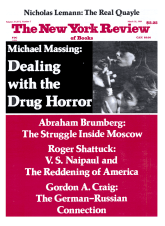Washington—The adversary process in criminal courtrooms is a device designed, however clumsily, to penetrate puzzles; but so far Oliver North’s trial has mainly served to thicken the clouds around the riddle of just who he was.
Special Prosecutor John Keker’s North was subordinate to no one’s wishes except his own, while defense counsel Brendan Sullivan’s North was the pure instrument of his president’s will. Government says that North’s works were his alone; and his lawyer insists that they were all the government’s.
Witness Robert Owen has come and gone, a North devotee like most of those called to testify against him and, like just as many, a deepener of his mystery. Owen recalled an afternoon in August of 1985, when he sat in the office of Benjamin Piza, Costa Rica’s minister of security, with CIA Station Chief José Fernandez; together they planned the construction of an airstrip for ferrying supplies to the exiguous operations of the Nicaraguan contras at the border.
This enterprise would be managed by Colonel José Montero Quesada, who had promised to show his gratitude for this commercial opportunity by designating the airfield as a military zone, assigning Costa Rican troops from his command to guard it, and rounding up a sufficient quotient of “peones” to lend artistic verisimilitude to its camouflage as a cattle ranch.
Then Owen was off to check the property, taking CIA Station Chief Fernandez with him as chauffeur and photographer. He returned to favor Lewis Tambs, the US ambassador to Costa Rica, with a briefing on the plan.
There may be those who have trouble with the special prosecutor’s suggestion that Oliver North was not a proper representative of the government of the United States. No such doubts need detain us about the status of Robert Owen. He had no credentials at all; he was a private citizen uncleared for classified information, let alone any transactions as covertly covert as this one.
In a few months, Owen would establish a tenuous official tie as a consultant to the State Department’s program for humanitarian aid to the contras, a responsibility to which he was welcomed by his new boss, Robert E. Duemling, with a churlish greeting as “Oliver North’s boy” and at which he busied himself most zealously when he was borrowing planes to ferry weapons after they had unloaded medical supplies and reporting back to North on the war’s lack of progress.
Until then Owen had traveled without visible trace of a portfolio; and yet, on a single day, he had negotiated with a Costa Rican cabinet minister, done the ambassador to Costa Rica the courtesy of an update on developments in diplomatic relations between the United States and his host country; and all the while the CIA station chief was in attendance as guide and bearer.
There come to mind in these tableaus the old stories about Soviet espionage that never so started the hairs as in the scene where the KGB courier proves his authenticity to his American contact with the signal, “I come from Julius.” Might not Robert Owen have arrived as a stranger and been able to open every door just by pronouncing the sovereign formula, “I come from Oliver North”?
There are two governments in the courtroom. One is the special prosecutor’s, which prayerfully hopes to bring the proceedings to a verdict; the other is the Department of Justice’s, which would be delighted to have them end in a mistrial tomorrow and might very well have done the office of extinction already if it had the nerve.
And perhaps the case is also about two governments, the dithering official one and Oliver North’s. His ambassador to Costa Rica outranked the State Department’s. His itinerant intelligence courier outranked the CIA’s station chief. And his defense contractors went where the Pentagon’s were forbidden to tread. The special prosecutor may be just stating a fact when he tells these jurors that Oliver North was no part of their government; he seems indeed, off Robert Owen’s witness, to have soared well above and far beyond it.
—March 2, 1989
This Issue
March 30, 1989



